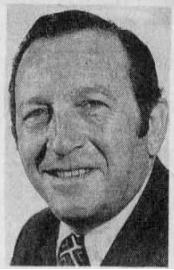
Maurice S. Osser (January 10, 1910 – September 30, 1995) was a Democratic politician from Philadelphia who served as City Commissioner.
Osser was born in 1910 in Philadelphia, the son of two Jewish immigrants from Russia, Benjamin Osser and Hannah Brody Osser.[1] Osser grew up in the old 16th ward, which housed a diverse collection of immigrant families.[2] He initially worked at his father's livery yard and attended Temple University at night.[3] The neighborhood was heavily Republican, but Osser became involved in the political scene of the Democratic Party, which was outnumbered two-to-one there. In 1931, while still studying for his bachelor's degree, Osser was appointed leader of the 16th ward.[2]
Internal party politics led to Osser's ouster as ward leader in 1933, but he remained a committed party worker.[2] He completed his law degree from Temple University Law School and practiced law. He was reelected ward leader in 1946.[2] In 1948, he ran for Congress in the 3rd district against Republican Hardie Scott and lost badly.[2] He ran again in 1950 in a much closer race. The official tally showed Osser losing to Scott by 925 votes, but he alleged that the race was stolen.[4] He took his challenge to the floor of the House of Representatives, but it was rejected.[2]
The following year, Osser ran for city commissioner and won. In that election, the Democrats overcame the Republicans' 67-year-old hold on city government and became the dominant party in the city. Osser joined fellow Democrat Thomas P. McHenry and Republican Walter I. Davidson on the three-member commission, with McHenry serving as chairman.[5] The office was a county office, a holdover from the time before consolidation of the townships in Philadelphia County into one city. The most important of the remaining duties of a commissioner in Philadelphia was the conduct of the city's elections; they also had responsibility for regulating weights and measures.[6] Because the commissioner's office was a state office, it remained exempt from the city's civil service regulations, making it a powerful source of patronage.[2]
After 1951, the Democrats held most offices in Philadelphia, but politics there were still combative, even on a personal level: after the 1955 election, at which he was reelected, Osser got in a fistfight with a Republican ward leader.[2] He was reelected again in 1959 and mooted for a seat on the local courts in 1961 and 1963, but the disapproval of the bar association stymied his changes.[2] In 1965, the commissioner's office was finally consolidated into the city government and stripped of its non-election-related duties, reducing the political clout of the job.[2] When the ward boundaries were realigned the following year, Osser became ward leader of the 63rd ward in Northeast Philadelphia.[2] He was easily reelected commissioner in 1963 and 1967, becoming chairman of the commission in 1964.[3]
Around that same time, Osser was accused of accepting kickbacks on a deal to replace the city's antiquated voting machines.[2] City Controller Alexander Hemphill got wind of it and City Council held hearings, but the disposition of some of the money was never discovered.[2] Osser drew more controversy in 1971 when the voter rolls were purged of 92,000 names, most of them African Americans.[2] In 1972, he was indicted for mail fraud and taking bribes that were said to total tens of thousands of dollars over the previous fourteen years.[7] He was convicted in United States District Court in December 1972 and resigned his office.[8] Osser served seventeen months of a six-year sentence.[3] He was released from jail in 1975 and retired from politics, but remained active in Jewish causes.[3] He died in 1995 at the age of 85.[3]
- ^ Inquirer 1966.
- ^ a b c d e f g h i j k l m n Leary 1972, p. B4.
- ^ a b c d e Sataline 1995, p. C12.
- ^ Inquirer 1950.
- ^ Bulletin Almanac 1952, p. 33.
- ^ Office of the City Representative 1962, p. 63.
- ^ Leary 1972, p. B1.
- ^ Strahahn 1972, p. A1.